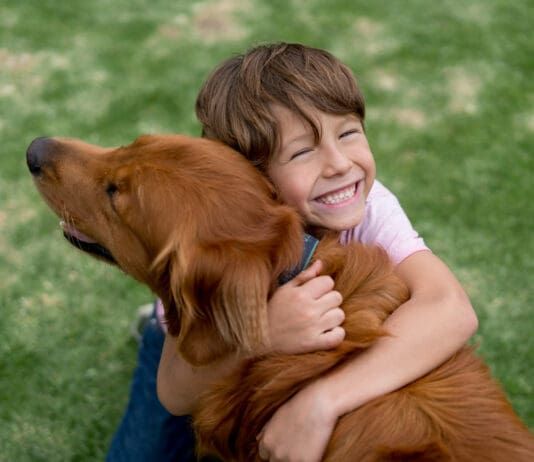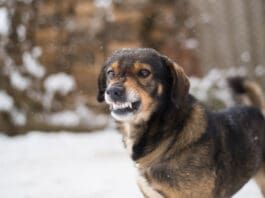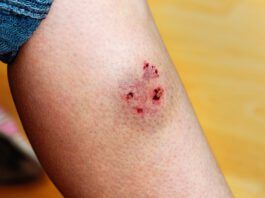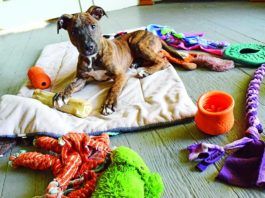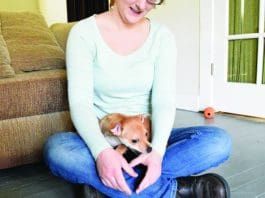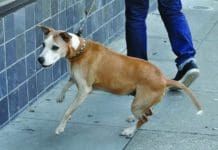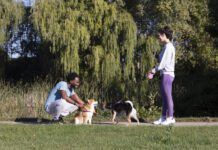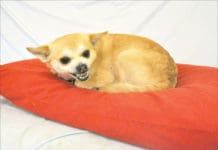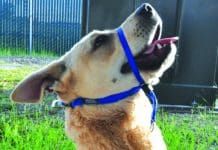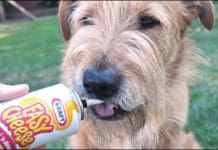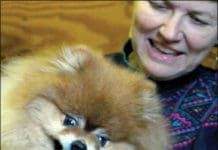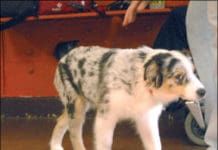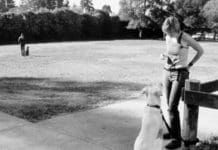Dog Growling is a Good Thing!
Finishing up my morning chores, I am sweeping the barn aisle when I hear ferocious growling erupt in the feed room. Do I drop...
Take Control of Puppy Chewing
Why do puppies chew? They chew to explore the world, and to relieve the pain and irritation of teething. But they also chew because it's a natural, normal activity for all canines, young and old. While puppies do eventually grow up and get past the stage where they feel compelled to put their teeth on everything they see, mature dogs also need to chew to exercise their jaws, massage their gums, clean their teeth, and to relieve stress and boredom.
Could My Dog Be Racist?
Almost as soon as I walked into Boomer's house I could tell his owner was nervous. This isn't all that unusual when meeting a new client for the first time. I always have my new clients put the dog in another room so we can get acquainted with each other and have some time to chat without being distracted. Very often, the clients are uneasy during these initial consultations; I've grown accustomed to it. After all, often they have agonized over acknowledging their dog's issues and their decision to call in a professional. But after a few minutes, I could tell there was something more. I'd been called to help her dog with his reactive behavior. She related that he lunged and barked at some people as they walked by. During our discussion, she seemed unusually pensive and was having difficulty making eye contact with me. So I pressed, Is there anything else you need to tell me? Whatever it is
5 Things To Do If Your Dog Snaps at a Guest
If you've never had to deal with that alarming moment when your beloved dog snaps at a guest in your home, you are fortunate. I hope you never do. But just in case, it's good to know that, first, you're not alone lots of dogs have snapped at guests in their homes (or worse!). Second, it's not the end of the world; it doesn't mean you need to euthanize your dog and it doesn't mean your dog will inevitably maul someone. It is, however, an important heads-up for you. How you handle the situation can often determine if your dog's aggression toward visitors escalates or diminishes. So if it happens, here's what you need to do:
How to Train Your Puppy Not to Bite
Contained in every puppy’s mouth is a set of amazingly sharp little daggers known as “teeth.” Puppies explore the world with those mouths. Since you are part of your pup’s world, it is inevitable that those sharp little teeth will at some point come in contact with your tender skin during a behavior known as “puppy biting.” It hurts. So what should you do when your puppy bites you, or other family members (including children)?
Does Your Dog Bite Your Hand While Receiving Treats?
Many of us have dogs who bite down too hard when taking dog treats – this is a canine behavior sometimes known as “hard mouth.” Some dogs take treats forcefully all the time; others get hard mouths only when stressed or excited. One theory is that a hard mouth is a function of bite inhibition – or lack thereof. If a dog doesn’t learn to use his mouth softly during puppyhood, he’s likely to resort to using too much pressure with his mouth throughout his life. But some dogs with acceptably soft mouths take treats hard when stressed or excited. Here are five things you can do when facing a “hard mouth” challenge.
Reinforce Your Dog’s Bite Inhibition
My dog bites me. A lot. Scooter, the 10-pound Pomeranian we adopted from the shelter after he failed a behavior assessment (for serious resource-guarding), has bitten me more times than I can count. Most of the time I don't even feel his teeth. He has never broken skin, and the few times I have felt any pressure, it's been because I've persisted in what I was doing despite his clear request to stop. Scooter has excellent bite inhibition. In the dog training world, bite inhibition is defined as a dog's ability to control the pressure of his mouth when biting, to cause little or no damage to the subject of the bite. We know that all dogs have the potential to bite, given the wrong set of circumstances.
Dog Growling: 5 Steps to Help Your Dog
Growling is a valuable means of communication for a dog something that dog owners should appreciate and respect rather than punish. Of course, we don't want our dog to growl at us, but neither do we want him to fail to growl if something makes him uncomfortable; that's very important information in a successful canine-human relationship. It's very common for dog owners to punish their dogs for growling. Unfortunately, this often suppresses the growl eliminating his ability to warn us that he's about to snap, literally and figuratively. On other occasions, punishing a growling, uncomfortable dog can induce him to escalate into full-on aggression.
Establishing a Good Bite Inhibition
Animal care professionals are fond of saying, “All dogs will bite, given the right (wrong) circumstances.” If that’s the case, how have I managed to suffer only two punctures in a 30-plus-year career working with dogs? Partly through reading and responding to canine body language well enough to avoid provoking an attack (see “How to Save Yourself,” September 2005). Partly, I’m sure, through luck. But largely, I suspect, because many dogs possess a wonderful quality known as “bite inhibition.”
Understand Why Your Dog Growls
Clients always appear a bit stunned at first when I tell them their dog's growl is a good thing. In fact, a growl is something to be greatly treasured. These are my aggression consultation clients, who are in my office in desperation, as a last resort, hoping to find some magic pill that will turn their biting dog into a safe companion. They are often dismayed and alarmed to discover that the paradigm many of us grew up with punish your dog harshly at the first sign of aggression has contributed to and exacerbated the serious and dangerous behavior problem that has led them to my door.
Living with a Difficult Dog
By your own standards, your dog’s life may not seem all that stressful – after all, he doesn’t have bills to pay, does he? But when you apply the more scientific definition of the word – anything that alarms or excites him, triggering his sympathetic nervous system into action and flooding him with the “fight or flight” chemicals adrenaline and noradrenaline – you may be able to see how many seemingly unrelated things in his environment actually contribute to his “misbehavior.”


